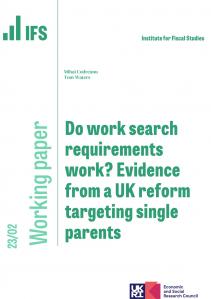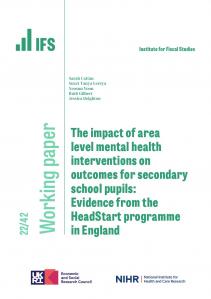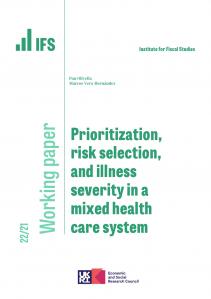Collection
Briefing and analysis
On Wednesday 20 October the Chancellor set out the government's spending plans for the years 2011-12 to 2014-15. IFS held a briefing to present our analysis of this report on the following day, Thursday 21 October. Presentations from the briefing can be found below.
Briefing presentations
- Opening remarks (Carl Emmerson, Acting Director)
- Where did the axe fall? (Rowena Crawford)
- Cuts to welfare spending, take 2 (Mike Brewer)
- Distributional analysis of tax and benefit changes (James Browne)
- Who loses most from public service cuts? (Cormac O'Dea)
Background to the Spending Review
- Analysis of the likely spending cuts facing public services, based on the announcements from the June 2010 Budget.
- Analysis of the cuts to public service spending implied by the three main UK parties' pre-election commitments.
- On 10 July Public Finance Magazine published an article, The axeman cometh by Rowena Crawford and Gemma Tetlow, which discusses in more detail the possible spending cuts facing public services.
- In May 2010 the new coalition Government announced a £6.2 billion headline cut to public spending in the current year. The first cut, an IFS "observation" by Robert Chote and Carl Emmerson, shows our estimate of the cuts to each department as a share of the previous Labour Government's plans, and the change in budget compared to last year.
- In our observation Can we assess the distributional impact of cuts to spending on public services?, Cormac O'Dea and Ian Preston discusses what we know about the impact of government activity on the distribution of household living standards, and how one might measure it in principle. Our Report The distributional impact of public spending in the UK offers a more in-depth analysis.
- HM Treasury guidelines on the spending review process - including which spending areas are open to review.
Public finances
- Disease and cure in the UK: The fiscal impact of the crisis and the policy response (a presentation given by Carl Emmerson at a European Commission seminar in June 2010) examines what we know about the effect of the financial crisis and recession on the public finances and the proposed fiscal repair measures.
- Before the recent general election Robert Chote, Rowena Crawford, Carl Emmerson and Gemma Tetlow examined what the three main UK parties said (explicitly and implicitly) about the scale, timing and composition of the fiscal repair job ahead, teasing out the differences and similarities.
Welfare benefits
- Two observations, Reforming welfare: less haste, more detail please and Child benefit withdrawal will mean some worse off after a pay rise examine the potential impact and design of changes to the welfare system.
- Our Briefing Note The distributional effect of tax and benefit reforms to be introduced between June 2010 and April 2014: a revised assessment by James Browne and Peter Levell attempts to reflect the impact of all the benefit cuts announced in the Budget.
- Child poverty, tax and benefit policy and the labour market since 1998-99, was presented by Robert Joyce at an IFS briefing, 'Reducing child poverty, and improving children's life chances', on 7 September.
- The Department of Work and Pensions consultation paper '21st Century Welfare' set out ideas for fundamental reforms to the benefits system. Welfare reform paper sets out sensible ideas for simplification, but ducks difficult decisions an observation by Stuart Adam and James Browne, presents a number of options for integrating different existing benefits.
- Our observation How to keep warm in winter: winter fuel payments or cold weather payments? examines the relative merits of these payments in advance of the Spending Review.
- In A tale of 3 indices: further thoughts on benefit indexation IFS researchers question what measure of inflation should be used for up-rating benefits.
- Poverty and inequality in the UK: 2010 assessed the changes to average incomes, inequality and poverty that have occurred since 1979, with a particular focus on the changes that have occurred in the latest year of data (2008-09) and since 1996-97.
Public-service pensions
- In an IFS observation Public-service pensions: more reform needed we look at Lord Hutton's interim report on public service pensions and suggest key issues to consider when future reforms are recommended.
- IFS Working Paper Occupational pension value in the public and private sectors examines the average value of pension accrual in the public and private sectors and what impact an across-the-board increase in the normal pension age from 60 to 65 might have.
- The value of teachers' pensions in England and Wales, a Fiscal Studies journal article, examines in detail the value of pension provision to teachers in the public sector in England and Wales, comparing pension accrual under both the pre- and the post-2007 schemes.
- In What is a public sector pension worth?, published in The Economic Journal, we measure accruals in defined benefit (DB) pension plans for public and private sector workers in Britain, using typical differences in scheme rules and sector-specific lifetime age-wage profiles by sex and educational group.
Education
- Financing higher education: On 12 October IFS researchers produced a press release Graduates and universities share burden of Browne recommendations, in response to the Browne Review of higher education funding and student finance. We then addressed some of the concerns raised about the Review in our Observation, A progressive graduate tax after all?.
- Financing schools: The Department for Education is currently consulting on the design of the proposed 'pupil premium'. IFS researchers published their response in a press release, Proposed pupil premium could increase school funding inequalities, and offered a more detailed analysis in a Briefing Note.
Emergency Budget June 2010
Our analysis of the Emergency Budget examined the impact on public finances, public services, welfare, business and the distribution of wealth.
Election 2010
Our analysis for the election looked at Labour's record and at the parties' proposals. The work was funded by the Nuffield Foundation.
Green Budget 2010
The IFS Green Budget 2010 assessed key questions that then Chancellor Alistair Darling had to confront for the March 2010 Budget. The areas covered are fiscal policy, fiscal stimulus and the consumer, options for fiscal tightening: tax increases and benefit cuts, public spending and the public finances, public sector pay and pensions, support for research and innovation, potential cuts to public services and reforming the UK's fiscal institutions. Published in collaboration with Barclays Capital and Barclays Wealth, the Green Budget also discusses the UK's productive capacity, the economic outlook and the public finances and sterling.








